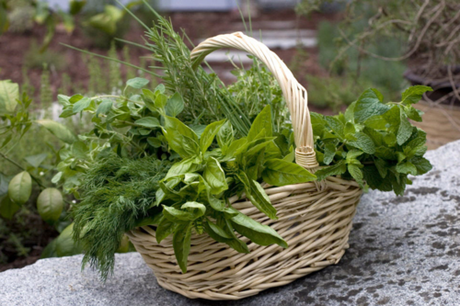 Basket from WRHS gardens/ photo origins unknown
Basket from WRHS gardens/ photo origins unknown
Just recently I received this wonderful question on my Outlander Love Affair page from one of my readers.
"Hi! I have become interested in homeopathy since reading the Outlander series. I was wondering if you recommended books for starters? I am wondering what herbs should be staples in my garden, when the best times to harvest and store and their best uses? Any advice would be most appreciated! Thank you!"
In response to this question I've decided to put together a simple series that all who are just learning can benefit from. An herb garden can be planted for many reasons and many who've read the Outlander series become completely inspired by Claire and decide to plant one so that they can create their own healing tinctures, infusions and tonics. The first thing that I need to say is that all students of herbalism need to remember that these plants are powerful medicines, even the ones used simply for culinary reasons. You need to be careful with them and treat them with the respect that they deserve.
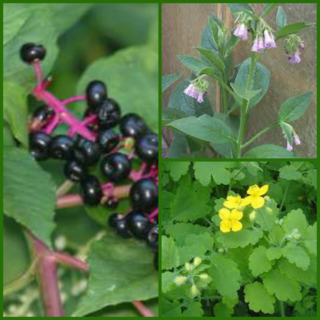
It's also important to remember that many herbs placed in the hands of a experienced herbalist are safe, but only because they know exactly what to do with them. Please ask questions first! For example Pokeweed, a gorgeous plant with large aubergine colored berries is quite poisonous at larger doses, but if prepared and used correctly can treat rheumatoid arthritis and other inflammatory conditions of the bones, joints and intestines. Comfrey , an absolutely wonderful plant has been suggested to cause liver damage when used extensively and in the wrong way. At the same time, poultices of comfrey and infusions of comfrey are used by herbalists to promote healing of fractures, muscle and joint pain, earning it the name of boneset. I use comfrey all of the time but in the way that I've been trained to do so. By the way...If for no other reason ,you should cultivate comfrey for your compost pile. It's one of the finest natural fertilizers that we have! Greater Celandine is another plant that I used when my husband got hit in the liver directly while sparring during Karate. He had shoting pains in his side and he became jaundiced. The doctors weren't sure what to do so we brought him home and began doses of Celandine tincture and olive oil and warmed castor oil packs that I applied to his side. WIthin two days his color had returned to normal. Celandine is a wonderful herb but you must be careful. In high dosages it can damage the liver instead of heal it.
Here's a list of some herbs to start a beginners garden with and all of these are culinary as well as medicinal. The purely medicinal herbs shouldn't be used personally until you've got some real experience under your belt and besides, there's more than enough simple and safe herbs to use to promote healing for almost any malady that you find yourself dealing with. Start with these, grow them and learn to use them well.
Savory Herbs
Basil
Chive
Dill
Oregano/ Marjoram
Rosemary
Sage
Summer/ Winter Savory
Tarragon
Thyme
Sweet Herbs
Anise Hyssop
Calendula
Lavender
The Lemon’s
(Thyme, Balm & Verbena)
The Mint’s ( including catmint!)
Rosemary
Scented Geraniums
Traditional herbalism (Folk herbalism) has been around for centuries. All of the supplements for sale in plastic bottles are a fairly recent phenomenon and readily available to us in a way the equivalent of a steak or chicken breast purchased wrapped in plastic is, which is to say conveniently. They are effective and I don't mean to suggest otherwise, but they are so removed from their source that their true subtle magic is almost impossible to discern. For that reason when I am asked to teach someone about the healing herbs, the first thing that I recommend is that they choose 3 or 4 at the most per season to become fully acquainted with. Be patient and you will be rewarded for that effort in many ways.
For the sake of this discussion lets say that you will have chosen 4 of my favorite herbs to plant in your garden this year, Lavender, any of the Mints (except pennyroyal which can be very dangerous if used incorrectly), Anise Hyssop and Sage. All of these can be planted in containers if you don't have a patch of land and they'll flourish that way. Their uses are very simple to learn and apply.
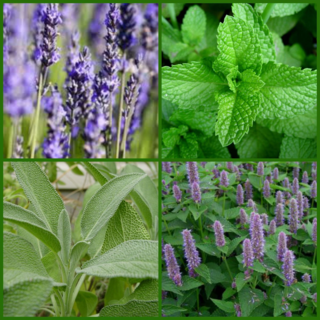
Lavender can be used in teas and sleep pillows for relaxation and to help calm a frightful headache or a childs nightmares. Mints are wonderful for the digestion and a principle component of "Tummy Teas". They are also fabulous energizers and great allies to use when trying to break a coffee or nocotine addiction. Catnip (or catmint) is a fabulously relaxing mint and great for the stomach as well! Anise Hyssop can be made into a poultice to treat burns and other wounds and it has an almost narcotic energy that relaxes you without sedating you. Infusions of garden Sages make exceptional mouthwashes and gargles for icky sore throats and I always grab a leaf or two of fresh sage to chew on when I feel myself to be a bit off of the mark. Blend these four together and infuse into a pot of hot water and you'll have a marvelous tea that's relaxing and restorative at the same time!
All herbs like different soils and some want wetter feet than others, so you'll have to really get intimate with them! Watch and listen. I've got 4 different typeas of lavender right now and each wants something a little bit different in the way of sun and nourishment! Read about them, study them, draw them ,watch them, feed them and taste them ...that's how you'll get to know them and getting to know them is the key to using them. I've just scratched the tip of the iceberg! Keep a gardening journal and notice what is happening to your plants day to day. Draw any bugs that you find on them, draw any specks or spots or flowers. That's how you'll learn what you need to know about them.
Here are some simple harvesting rules for you:
Harvest Herbs after the morning dew has dried but before the hot afternoon sun
(approximately 11:00 am)
Harvest before the plant flowers or after flowering when new growth appears
Wash every herb that you plan to eat in cool water until no dirt remains
Most herbs can be dried for later use
Most leafy herbs need to be stripped off their stems before using
Store dried herbs in glass containers away from heat and sunlight. Do not store them in plastic.
Freeze all herbs that you plan to store for at least three days, then thaw , strip and dry. This insures that you'll have no creepy, crawly visitors
Label and date all dried product. Don’t hesitate to toss aging herbs as they can become flavorless! If you can't bear to toss them, use them in potpourri
Generally do not mulch them as they don't need it. When feeding, less is more. Remember that you're going to eat the end result. Please stay away from any chemical based fertilizers and herbicides. Fish emulsion, chicken poop and a container full of ladybugs and several praying mantis cases are all you'll need!
Here are some great books to start your journey with, I've got hundreds in my library but these will get you well started!
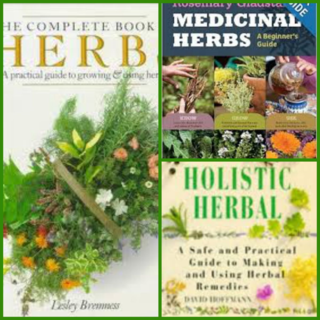
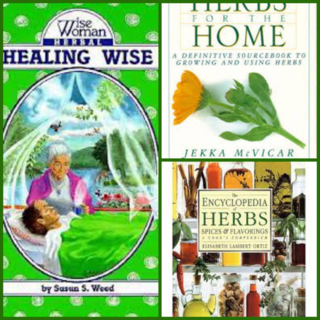
Next post we'll talk about my personal favorites....The wild allies! ( Some people call them weeds!)
I am not a registered nutritionist , dietician or personal trainer. I am a Board Certified Holistic Health practitioner. Any advice that is given is based upon my own personal observations, opinions or experiences I've had in life and the training that I've accrued.
Many don't realize this but the herbalism is not regulated nor licensed by any governing body in the US. There are no real legal title designations for American herbalism. To maintain personal standards and relay the degree of learning obtained, herbalists in America typically use the title their school or teacher gave them . Use your own instincts to determine the level of expertise posessed by any practitioner that you consider using to help you enhance your health and well being. I am of the opinion myself that this places the onus on us to be teachers who will help you in your quest for wellness and that if we do our job right you'll be able to understand and utilize these plants, foods and extracts yourself for your overall wellbeing.

